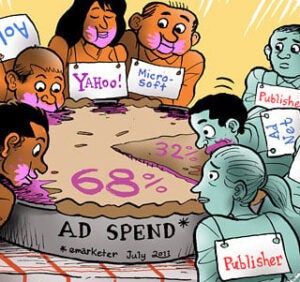“Data-Driven Thinking” is written by members of the media community and contains fresh ideas on the digital revolution in media.
Today’s column is written by Eric Berry, co-founder and CEO at TripleLift.
There are several intersecting issues relating to identity in ad tech today. The challenge is that the solutions often fail to align directly with the most significant problems.
The single biggest problem is that browsers are blocking third-party cookies. Safari has gone the furthest by making it difficult to do any form of cross-domain tracking. Firefox is not far behind. On the other hand, Chrome, which is roughly the size of all other browsers combined, may never block third-party cookies.
Today’s identity discussions often focus on the challenge of syncing cookies across ad tech providers. Many ID consortia, for example, create a single cookie that ad tech partners can use without the need for each partner to sync with each other. While this is helpful, the IDs often reside in a third-party domain, so they don’t survive Safari and Firefox blocking.
Alternatively, other consortia IDs live on the publisher’s first-party domain, meaning that they may provide session-level frequency caps on a particular publisher and can be used for short-duration click-through attribution. They provide a small subset of the functionality available to cross-domain cookies, such as attribution and broader session or lifetime frequency caps.
Still other ID solutions require users to enter an email or similar identifier, which would live on a first-party domain, and then use a hash of the identifier to synchronize across sites. These may work for publishers that can compel users to enter this information, but ultimately their ability to scale will be tied to users’ willingness to submit their emails or ID on each publisher, device and browser around once a month.
I am not optimistic about this approach, despite the potential increase in email walls and publishers that may share first-party domains to expand their scope. GDPR also makes many attempts that force users into tracking potentially (probably) illegal. So none of these solutions survive the strict GDPR-mandated approach to RTB.
This is all to say that the number of users who will allow any form of persistent identity will decrease. Non-Safari, non-Firefox, non-European users will be targetable, but the pool of users that can be cookied continues to shrink. This excluded pool is very large and very important, yet very few are seriously considering how to effectively market to this group beyond vague platitudes about context.
Marketers have generally not changed their tactics, so the industry is largely trying to create solutions that persist or optimize legacy types of campaigns. But really the problem is upstream: The old tactics will work less and less.
The pressure to find new tactics isn’t intense yet, because the US-based Chrome pool of users is still quite large. The industry, however, needs to really think hard about the future of monetization.
AdExchanger Daily
Get our editors’ roundup delivered to your inbox every weekday.
Daily Roundup
Marketers should think about advertising that works well sans cookies, and publishers must pursue revenue diversification and monetization strategies that provide experiences that work in a cookieless world.
Follow Eric Berry (@ezberry), TripleLift (@triplelifthq) and AdExchanger (@adexchanger) on Twitter.














